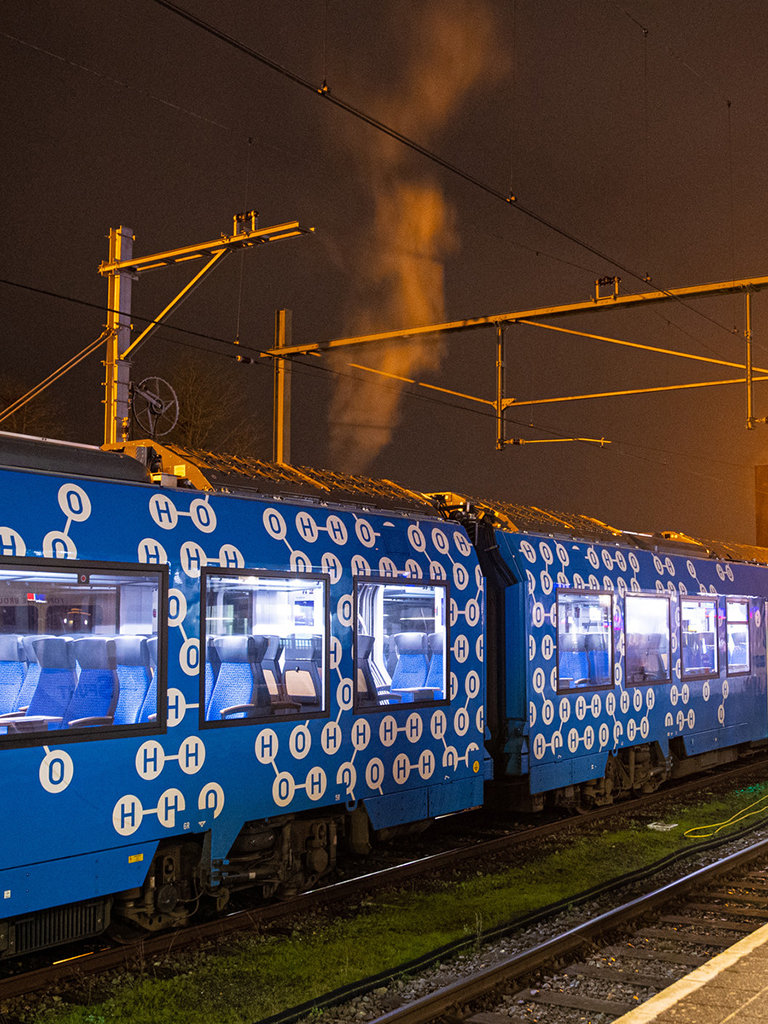
Hydrogen takes centre stage in the energy transition
Special Report: Offshore renewables
Text by Jurjen Slump - photagraphy by Stefan Verkerk, commissioned by ProRail
Sustainably generated hydrogen is set to play an important part in the energy transition. Electricity alone will not be enough, says Ad van Wijk, Professor of Future Energy Systems. Political decisions will ultimately determine whether the hydrogen economy gets off the ground. “This is more than just technology; it’s about changing the system.”
But first, van Wijk is keen to rectify a misunderstanding: the hydrogen economy isn’t just about hydrogen. It’s about “a smart combination of electricity and hydrogen”. For example, what is the best way to prepare old, poorly insulated houses for a sustainable future? Answer: with good insulation, a heat pump and a boiler that runs on hydrogen to help out when it freezes.
“That is the fastest solution, and the cheapest option if we want to prepare a large chunk of the current housing stock for a sustainable future”, van Wijk says. You are basically using two existing systems: the electricity grid and the gas grid. The electricity grid does not need to be vastly expanded to increase capacity, and the gas grid can be adapted to hydrogen.
Energy consumption
Moreover: electricity only accounts for around 20% of the total energy consumption in the Netherlands. Many sectors are unable to switch totally to electricity. Van Wijk frowns at the thought of no longer connecting existing housing estates to the gas grid. “The gas grid doesn’t supply homes only; it also supplies bakeries, launderettes and professionals like roofers. They all need high temperatures. Electricity simply isn’t enough. They need gas.”
The same applies to industry, aviation and haulage. Battery technology isn’t suitable for trucks to drive long distances or to take people to Turkey on holiday flights. The same goes for storage.
Cheap
Why hydrogen? “It’s the cheapest way of generating electricity where there is a strong wind or a high solar radiation, but that is often in places that are a long way from where it is needed.” The most solar energy can be generated in the deserts around the equator, and sea wind is the best for generating electricity. By converting electricity into hydrogen in the place where it is generated, you can transport it much more cheaply than when you have to lay intercontinental power cables.
Van Wijk has calculated that the cost of transporting hydrogen through a pipeline is “10 times” cheaper. The storage costs are “100 to 200 times” cheaper, even discounting the fact that you can’t store large amounts of electricity in batteries for months. While it is true that some energy is wasted if you have to convert it into hydrogen and eventually back again, overall, it is still cheaper.
Transport
“This is no different from how the current energy system works”, according to van Wijk. “We don’t build a power plant on top of a gas field in Algeria and export the electricity. Instead, we export the gas, and then we convert it into electricity.” This is how the future hydrogen economy will work too. “Using hydrogen as an energy carrier cuts the costs of transport and storage. That way you can transport renewable energy cheaply to where you need it, anywhere in the world.”
We moved from the steam era into the combustion era, and very soon, we will find ourselves in the electrochemical conversion era (see text box). Despite the huge scientific challenges, van Wijk thinks that a hydrogen economy should be possible by 2050. A lot depends on the government, though. “The main change needed is a system change, and this needs to be led by policy.”
The government must make the next move
The decision to develop the gas grid in the last century was also made at the top. “Suddenly it was time to make a decision: we would connect everyone to the gas mains.” The policy on a sustainable and renewable economy will not be any different. “And this is the main crux of the problem”, van Wijk concludes. “The technical solution is both feasible and affordable. But we need a solid policy. We can’t just think ‘we’ll get there in the end’. The government must make the next move.”
The Cabinet’s vision on hydrogen
In March, the Cabinet presented its vision on hydrogen. In the words of the Minister for Economic Affairs, Eric Wiebes, hydrogen is a “necessary link” in a sustainable energy system. “Investment in sustainable hydrogen in the Netherlands will create new jobs, improve air quality and is essential for the energy transition.” Prioritizing the development of hydrogen with a minimum of delay is “particularly important” for industry. “The Cabinet hopes that it is sending a clear message by stressing the importance of CO2-free hydrogen, presenting an ambitious policy agenda and taking essential steps to complete the infrastructure and other conditions on time”, said Wiebes.
E-Refinery
The energy transition has far-reaching implications for chemical companies. E-Refinery at TU Delft enables industry partners to start building the required technological capacity and human capital as soon as possible. Researchers in the e-Refinery initiative focus their research on the electrochemical conversion of sustainable electricity into fuels and chemical building blocks, from the molecular scale to large-scale system integration. Implementing e-Refinery will serve three important challenges that society is facing: CO2-neutral fuel, seasonal energy storage and a defossilised chemical industry.